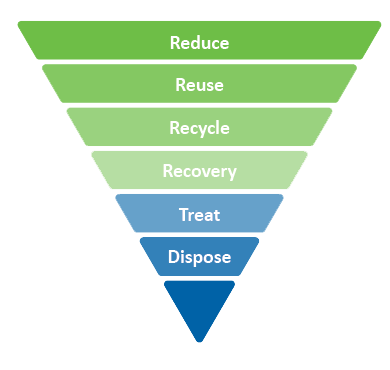Waste minimisation is the practice of reducing the amount of waste we generate and dispose of. Its main goal is to achieve a more sustainable way of living that will ensure the future of our planet.
In 2016, New Zealanders sent an average of 730.6 kilograms (kg) to landfill per person*. This means:
Minimising our waste is key to protecting ourselves, our natural world, and our future.
There are lots of different things we can all do to minimise waste, and you can find some helpful tips on this site.
The most important thing to remember is that it doesn’t have to be a big overhaul of your lifestyle and habits – do what you can and make small changes to minimise waste, based on where you’re at.
A great framework to help get started is the waste hierarchy (see diagram). This is a useful guide sets out how each of us should be dealing with waste responsibly. Let’s focus on the top three: reduce, reuse, recycle.

The easiest way to minimise waste is to avoid it in the first place. Reduce is at the top of the hierarchy, because if we do that first, there’ll be less waste left over to dispose of. Here are some easy, everyday examples of reducing:
These simple examples of waste reduction mean there is less (or nothing) to dispose of at the end.
The next-best way to minimise waste is to reuse. Reusing is all about seeing waste differently – not as something disposable, but something useful for a second, third, and fourth time, or another purpose altogether.
By reusing again and again, we can use items for as long as possible before they ultimately end up in our landfills. Here are some ways to reuse items that you may already be familiar with:
The third approach on the hierarchy is something we’re all familiar with – recycle. Recycling is when we convert waste into a new object or material. It’s another great way to keep things out of the landfill.
Recycling has been done for many years, because it uses less energy and raw materials than producing new items from scratch. It’s also typically cheaper to recycle than send items to landfill.
However, recycling can only be successful if everyone takes responsibility to recycle correctly, which can sometimes be confusing as different councils have different rules.
Recycling is third on the hierarchy because it is not completely waste-free; if recycling is contaminated, then the items still end up going into landfill, and some things can only be recycled a certain number of times:
So, while it is great to recycle, we should all be encouraged to look further up the hierarchy and also focus on how we can reduce and reuse!
You can still take your excess rubbish and recycling to the Lincoln St Resource Recovery Centre - 60 Lincoln Street, Frankton, Hamilton.
Opening hours:
Monday to Saturday: 7:30am to 4:30pm
Sunday and Public holidays: 9am to 4pm
Closed: New Year’s Day, Good Friday and Christmas Day
07 848 2517 | Envirowaste
Start with one small change at a time. This way the changes will be more manageable and future ones will be easier. What you focus on first could be what makes up most of your rubbish, or what is the easiest to reduce – or both!
To learn how to recycle correctly in Hamilton, check out our kerbside collection page which will help you ensure that what you put out gets recycled.
Follow websites or groups for ongoing ideas and inspiration – and to share what you’re doing and why with your friends, family and workmates. You’re not alone on your journey to less waste, and it’s easier when you can learn along with others. Check out places like Love Food Hate Waste, the Zero Waste NZ! Facebook group, and the Zero Waste Kirikiriroa (Hamilton) Facebook group.
Hamilton City Council's Waste Minimisation Fund receives $50,000 a year from the National Waste Levy administered by the Government. This money is allocated each year to groups and organisations in the Hamilton City area that are operating projects achieving and/or promoting waste minimisation.
Find out more about the fund here.